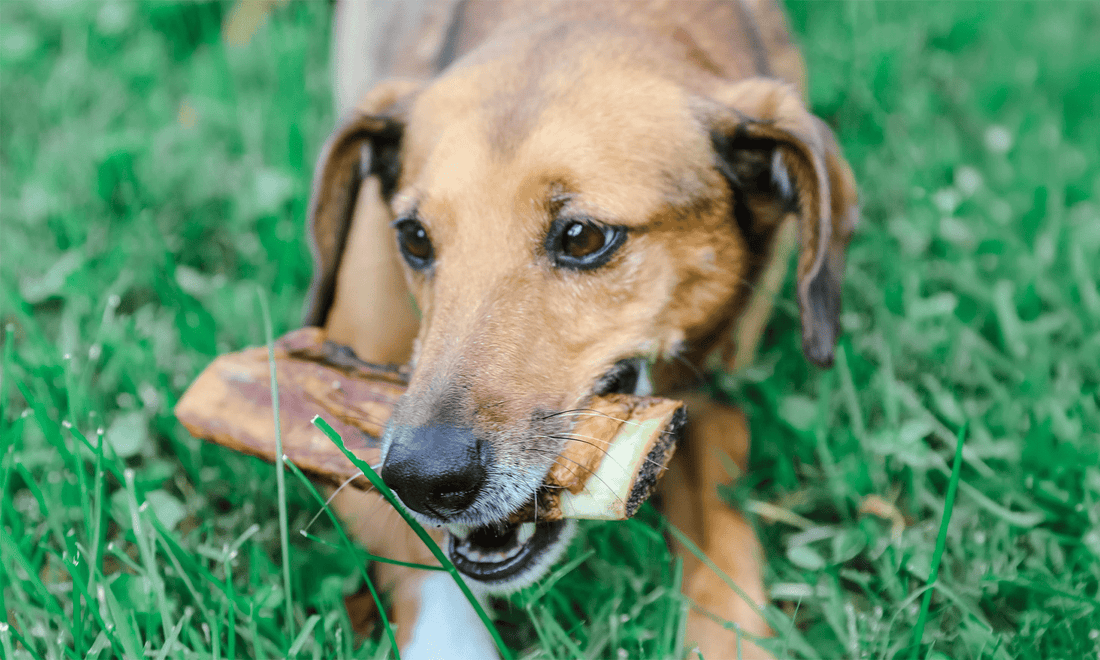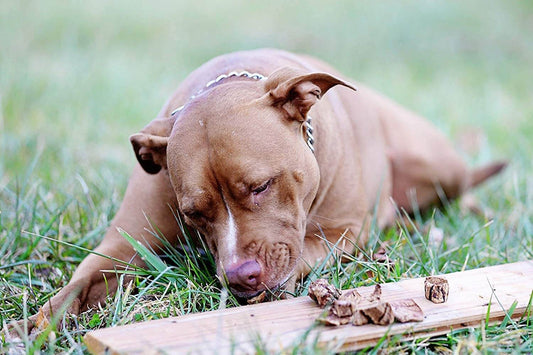
Why Do Dogs Like Bones? Dawn’s Guide to the Age-Old Mystery
Dawn Miller Nov 09, 20244 Minute ReadLast Saturday, I found myself at the community dog park event, “Bark in the Park.” Among the booths where local vendors show off their pet-friendly wares and services, they had games for dogs and people alike. The prizes—dog treats, dog bones, shiny collars, fancy dog bowls, chew toys, and more. The most coveted prizes were the big, meaty dog bones.
They had chew bones for all sizes, individually wrapped for later. The lucky dogs who won those wouldn't just get a treat for today. They'd be chewing on those bones for weeks if not months. Seeing all the dog bones circulating in the crowd naturally sparked conversations about "Why do dogs like bones?" "Wouldn't they rather have a treat they can eat?" "What types of bones are good for dogs?"
The answer, my friend, takes us back to dogs’ primal roots. Their ancestral wolf had a drive to survive and get the most out of life while doing it.
Why Do Dogs Like Bones?
It's simple: dog instinct. Their ancient relatives developed certain instincts because they helped the wolves and their pack survive. Before kibble, wild dogs and wolves had to hunt. And because prey animals could hide and outrun predators, these wolves didn't know where their next meal was coming from—or when.
So, they had to get the most out of the meal. That meant eating everything they could except the skin. They only ate that if there wasn't enough good stuff to go around.
Better Nutrition = Stronger Dogs
Now, different parts of the animal have different nutrients. For example, there's not much vitamin C in meat. But it's prevalent in body organs. So, to get enough vitamin C, they would need to eat things like the liver, lungs, and kidneys. Organs are also rich in collagen and lots of B vitamins.
Tissues like cartilage are rich in glucosamine and chondroitin, which are well-researched for their bone and joint-supporting effects.
The dog bones are rich in calcium and magnesium, while the marrow inside has a lot of collagen, B vitamins, fat-soluble vitamins, and healthy fats.
So, the wolves that were eating more parts of the animal got better nutrition. They were healthier and better able to pass on their genetics to what would eventually become our beloved poodles, bullies, and terriers.
Better Dental Health = Survival
If an ancient wolf lost the ability to chew, they would stop eating. And that was it.
So, those who could maintain stronger teeth, gums, and jaws had an advantage. Chewing on dog bones scrapes plaque off teeth. It massages the gums, promoting healthier tissues. And it strengthens the jaw for solid chomping action.
Entertainment = Better Quality Life
Wolves also learned to chew on bones to pass the time between hunting. The rich marrow inside the bone only comes out a little bit at a time. So, they could spend hours with one bone. And it was fun. They would lick and chew and turn the bone around in different ways to try to get the marrow out.
And each time they did, they would get a little dopamine hit. Marrow is sweet and buttery. It's a treat for a dog. Marrow bones are like a dog's version of social media. They keep scrolling, hunting for that next hit of sweet marrow.
Now, entertainment is important for all of us. It helps us unwind, destress, and get through boredom. So dog bones are also great for mental health, reducing anxiety, and generating a general sense of wellness.
Now, a lot of dog moms and dads don't know this. But if you've got a dog that's anxious, acting out, barking all the time, or destructive chewing, these are signs of poor mental health. I credit my dog's regular dog chew bone routine 2 times a week to saving our relationship.
No more chewing on things he shouldn't or becoming destructive every time I leave the house.
Bottom line: Life is more fulfilling for a wolf and my dogs when they have marrow bones for dogs.
What Types of Bones Are Good for Dogs?
Marrow bones are the best bones for dogs because they still contain that nutritious bone marrow inside. I also look for single-ingredient marrow bones. I don't want anything weird injected in the marrow. It should just be a marrow bone.
Now, it's important that the bone is prepared correctly. I know that wolves eat their bones raw. But they're also not jumping up on my sofa afterward. So, a slow and low heat cooking process that kills pathogens but retains the nutrition and outstanding meaty flavors is preferred. This also gives the bone a good density so it can withstand aggressive chewing.
Oh, and one more thing. I also look for grass-fed beef marrow bones because they're higher in omega-3 and lower in saturated fat.
These types of bones that are good for dogs could include beef:
- Femur bones
- Shin bones
- Knuckles
- Ribs
You can get these premium bones from a USA-based vendor that gets dog bones from USA-based beef cattle ranches.
The Best Chew Bones for Dogs
The size of the bone is important because when a dog chews on a marrow bone that is too small, they could accidentally swallow it and cause a blockage. It's also nice that the bone isn't so big that a little dog can't carry it around to get the most out of it.
For this reason, I appreciate it when dog bone vendors categorize their bones by size. For example,
The Meaty Goliath Bone is extra large for big dogs who need big bones. My lab mix, Bruno, is big (over 50lb) and likes to engage in tough chewing. These bones last even when put up against his powerful jaws.
My terrier Pixie is over 15 lb, so she needs a bone that's a little smaller—but not too tiny. I choose Meaty Rib Bones to match her appetite for an extra meaty chew bone.
Small dogs and most puppies love smaller bones like riblets.
Another reason I love these all-natural, single-ingredient bones is that I can get extra chew time out of them by refilling them with fun, dog-tested recipes in this dog bone refill guide.
Why Choose All-Natural?
At the end of the day, natural is best. Our dogs deserve bones for dogs that are as clean as possible and free from unnecessary additives. They deserve to enjoy dog bones that are as close as possible to those enjoyed by their ancestral wolves. When they have this nutrition, dental support, and entertainment, they too can thrive.
Plus, natural bones are usually tougher, making for longer-lasting chews—even with aggressive chewers. (Also, fewer weird smells — a bonus for all of us “dog moms and dads” out there!)
Want to know more? Check out this article next: Best Natural Bones for Dogs: What I Give My Prize-Winning Pup
Available On:





